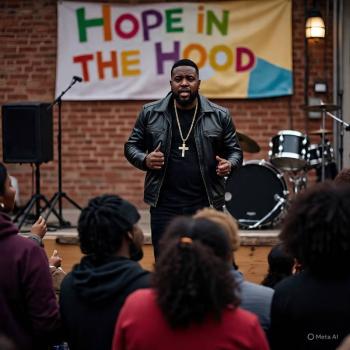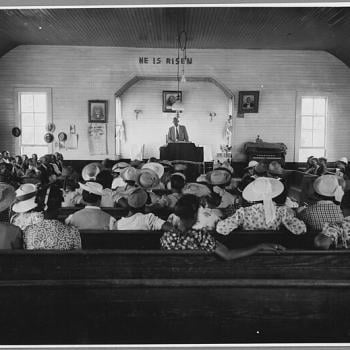I took up the thought experiment on the differences in how Christian Hip Hop artists define their work. Progressing down this unexpected rabbit hole, varying labels began to surface. I was aware there would be some separation on how artists working in this subgenre appropriate the term “rap” and the category “Hip Hop.” What research unfolded was the identity formation, ownership of terms, and an undercurrent position of authority in the subgenre.

Taking the step to analyze the terminology of this subgenre, I went back to the original questions: “What’s the difference, or is there any, between gospel rap and Christian Hip-Hop?” “Why do some artists require one over the other?” “Are the four elements of Christian Hip-Hop, discipleship, personal testimony, evangelism, and scripture-based lyrics, being used to help qualify a canon?”
Further questions rose to the surface: “How is the terminology used to separate artists?” “Do these labels generate a stereotype of the subgenre to secular audiences?” “How do these varied camps express the core principles of Christian Hip Hop to spread the gospel and share the Word?” “Are these layers of hierarchy and privilege of one’s understanding of faith and the gospel over another, without relating to and supporting the totality of the word of God?”
Though it is beyond the limits of this article to explore each of these points, further articles will need to take up this call to arms. What can be explored at this early, fertile stage is the use of terminology and how these are used by artists to outline an artistic expressive agenda and faith-based identity. Do Christian Hip Hop artists recognize their work is being collected by theomusicological scholars, under this larger parent category? Does this even matter in the larger scope and core intent of Christian Hip Hop’s alignment to the gospel, take out the Word, and make disciples?
“Therefore, go and make disciples of all nations, baptizing them in the name of the Father and of the Son and of the Holy Spirit,” Matthew 28:19 NIV.

When A Writer Provides Definitions
A 2020 article published by Rapzilla, “Gospel Rap vs. Christian Rap: What’s the Difference? What’s the Narrative?” states the following,
“Although we often call the Christian section of hip-hop “Christian Hip-hop” or “Christian Rap,” one may also hear the term Gospel Rap. So what is Gospel Rap? Is it different from Christian Rap? Does one encompass the other? It’s a deep topic and requires a lot of discussions” (Joshua Stratford, Rapzilla, September 2020).
The article presents valuable points, yet contextualizes these two camps with a slight difference. The overarching subgenre term, Christian Hip Hop, is not defined as a parent category. The article focuses more on which artists fit which definition, and their definitions of Gospel Rap or Christian Rap.
Defining Gospel Rap, the article notes the following,
“It is also important to note that it is more correct to identify an artist as a Gospel rapper rather than a song as a Gospel rap song. These artists typically quote the Bible frequently in their music. The topics of their songs are mostly comprised of Gospel themes. Sometimes we hear the term ‘ministry over music.’ That is Gospel rap” (Joshua Stratford, Rapzilla, September 2020).
The writer correctly points out the difference between a rapper and rap as an element of (Christian) Hip Hop. This is one area where the writer does not finish the line of thinking, noting the use of biblical references as being one of the core elements in Christian Hip Hop. Continuing to sift out useful definitions for the terminology, the writer contextualizes Christian rap. It is here where the differences become more visible.
“Christian Rap, on the other hand, encompasses Gospel Rap. These artists may not necessarily rap about God on every single song. Even still, they have clean music that doesn’t contradict the standards of the gospel…Thus, those who only fall under the Christian Rap category don’t restrain themselves from talking about God. Rather, they don’t limit themselves to religious themes in their music” (Joshua Stratford, Rapzilla, September 2020).
The writer misses the mark on this point. Artists who qualify their work under the umbrella of Christian Hip Hop are those who align their work with the four core elements of Christian Hip Hop, testimony, discipleship, biblically-centered lyrics, and evangelism. The writer chooses to subjugate (Christian) Hip Hop artists who do “not necessarily rap about God” as being Christian Rappers. This is a marketing strategy, rather than a suitable definition of the works by such artists who use their faith-based/Christian works for recognition. This label counters the “ministry over music” label the author presented earlier. The difference, I argue, between these two definitions is that Gospel rap is a label within the large parent Christian Hip Hop subgenre. Christian rap would be a personal label applied to an artist rather than one seeking to define a category. Where Gospel rap outlining works aligned with the four core elements of Christian Hip Hop is suitable, Christian rap should be represented as “Christian Rappers.” Those artists who elect to tokenize their faith-based/Christian works for market promotion are not apt to involve the four core elements of Christian Hip Hop. Therefore, such artists should not be included in this parent genre.
Taking the “ministry over music” label the writer recognizes as being in popular use would be a way to open the discussion on the value and importance of Christian Hip Hop to those outside of the vernacular. The writer takes useful space to justify this term and realign it as synonymous with Gospel rap. I argue the contrary. Gospel rap is a useful term, being self-referential. “Ministry over Music” is the language to employ and begin to express the core elements of Christian Hip Hop and the difference between the parent category, Christian Hip Hop, which is not synonymous with Gospel rap, as the secular stereotype maintains.
The article is useful to those seeking to understand these terms, their use, and the potential meaning behind each. However, without pointing out the four core elements of Christian Hip Hop, the article falls back on being a supporting agent for artists, which Rapzilla finds credible to their standards.
What Artists Say
The article “What Is Trap Gospel? How A New Generation Of Christian Rappers Are Grabbing The Attention Of Believers & Non-Believers,” cites Christian rapper Yewande Dees, aka Wande.
“Wande and her peers encourage people who aren’t fans of trap or rap to focus on the message and how it’s changing the lives of believers and non-believers. ‘I always say look at the fruit and how many people are being uplifted by the songs, she says” (Grammy Awards Highlights, February 2024).
The article goes on to cite other notable Christian rappers as BigBreeze, Mike Teezy, and Alex Jean. These artists are credited for their work in getting the gospel into the ears of Christian/faith-based and non-Christian/non-faith-based audiences. The article takes a look at the use of trap Hip Hop, from the Atlanta, Georgia area, and how this style is paving the way for audience attraction. A good point to raise, the article does include a fair amount of conversations with each artist and their perspective on Gospel rap and Christian rap. Nowhere in the article is Hip Hop culture securely aligned with faith-based lyrics. The interviewer, Rosemary Akpan, is more inclined to present the use of lyrics and gospel dissemination through rap. The article maneuvers its way to discussing trap Hip Hop, which is the only singular point where Hip Hop culture is included.
Teezy states, “I feel like a lot of [Christian rappers] now are approaching [music] that way too,” he says, adding, “we’re preaching the same message about Jesus Christ but approaching it differently to reach different people, areas, and cities” (Grammy Awards Highlights, February 2024).
Two points stand out in this quote: the term “Christian rappers” and the “message” (read: gospel). These are two of the core elements in Christian Hip Hop. What Teezy, and the others in the Grammy Award Highlights article articulate, in so many words, is the overarching structure of Christian Hip Hop.
The four elements of Christian Hip Hop are discipleship, personal testimony, evangelism, and scripture-based lyrics. Multiple artists across the discourse of Christian Hip Hop integrate these elements, constructing a consistent lexicon. The question remains, “Why is there a division in terminology used to construct a separation between faith-based Christian Hip Hop artists?” Each artist throughout the faith-based Hip Hop subgenre qualifies their coming to faith-based Hip Hop from the secular world first. The few who come from a solid history and connection to their faith first, and then begin to explore Hip Hop culture to articulate gospel doctrine, are more of a rarity than the norm. This alone is not enough evidence to secure the different use of the terms, Gospel rap and Christian Hip Hop, as definitions to articulate a faith-based Hip Hop subgenre. The different use of these terms, and an artist’s relationship to one or the other, underscores their connection to, profiling of, and credit given to faith-based Hip Hop artists using different labels and, in concert, music styles. What is missing is the qualifier that each artist, no matter where they reside along the lineage of faith-based Hip Hop, if they are using the gospel’s message properly in their works, can be defined as a faith-based Hip Hop artist. This, on its own, is fine, but there’s much more to unpack.
Terminology is not a platform to stand on and create divisions. If we look at the arch of the subgenre Christian Hip Hop, the multiplicity of voices is included to structure the foundation of the subgenre. By definition, Christian Hip Hop is a subgenre of the larger parent canon, Hip Hop. Christian Hip Hop includes each of the expressive signifiers of Hip Hop culture narrated along a faith-based, Christian, gospel discipline. This is what makes Gospel rap and Christian Hip Hop a subgenre. My argument is, if Christian Hip Hop is the next level down from the parent Hip Hop culture, then Gospel rap would be a third level in this sequence. This logically works in theory. There are faith-based Hip Hop artists who have been, and continue to, stress the importance and value of this classification. Mainstream news, Hip Hop/Hip pop, and journalists who are outside of the faith-based expressive circles will gravitate to what term is the most common, not to the artists or genre, but to the mass public and consumers. Faith-based Hip Hop artists will, at some time, be forced to qualify their work in either discipline the artist elects to follow. The terms communicated to define their work, in the eyes of the mass non-religious, present a synonymous reading or a misunderstanding of the terms themselves. Those who are faith-centered Hip Hop artists will, if necessary, pull the plug on the argument. This latter point will not engage in the debate of terminology to favor the creative work in honest praise of God. Yet, the reality remains, some faith-based Hip Hop artists see these divisive terms as important for a granular qualification. The trouble with this perspective is the embedded definitions of each element and its relationship to the larger parent qualifier, Christian Hip Hop.
The result of holding firm to these labels is the concertizing of separation. Artists who are called to put their faith first in their work cannot afford the time to argue with divisions. Stereotypes and potentially derogatory references will surface and will be used to create privilege. Such a result does little to promote the core elements of Christian Hip Hop. Further, such actions move the needle away from the Great Commission and the unification of brothers/sisters as noted in scripture.

Start The Inquiry, Construct The Discourse
There are articles about this debate as far back as 2009. One video short, “Is Christian Rap A Bad Thing?” stands out, not only because of the title and its relationship to the theme, but also because of the simplicity of the statement in this short, and how it was created to be shared.
This short reel does a good job of introducing the debate about the content and use of Christian rap. Though the narrator misassumes rap as being the same as singing, there is a strong difference between these styles as singing is a lyrical vocal style, and rap is based on a lyrical narration of a text without any melodic direction, , the argument helps get the conversation started, and this is the important part. The debate about Gospel Rap or Christian Hip Hop can divide these views into opposing camps. This has become more of the norm in current times. As more Hip Hop artists are coming to the mic as a vehicle to share their Christian faith and testimony, a perspective on these expressions is going under the microscope. Does the rap discuss a personal perspective and not fulfill the Great Commission (Matthew 28:16-20, Mark 16: 15-18, Luke 24: 44-49, John 20: 19-23, Acts 1:8 )? Does the work overly focus on scripture to the extent of being a lyric sermon? These opposites outline the argument for each camp.
Calling Yourself A Gospel Rapper
Those artists who qualify themselves as Gospel Rappers tend to be more self-referential with their work. (include citations here, NF “When I Grow Up”
The language is not centered on scripture. To see how the rap is aligned with the four elements of Christian Hip Hop is a stretch. This appears more often than one would expect. If the label this camp frames their work on is “rap,” the lyrics and language would follow a biblically centered ethic. The rare examples that do include more language that is faith-based are limited in their rap style, for example, “I’m one too” by Brother Ig.
To help advance the term “Gospel rap” from these examples, Rapzilla includes a resource as a counterpoint.
This example highlights the use of rap. Each artist in the cypher brings a different approach to scripture-centered lyrics and a variety of styles. The focus is not on the rap, but on articulating the core elements of Christian Hip Hop. Founded on gospel doctrine – Prodi the Prodigal in this example states the gospel specifically – this is a prime example of Gospel rap. Following a consistent point, other Gospel rappers include defining their work in a secular Hip Hop/rap context, the collected artists in this example include this perspective, but do not allow it to be the central point in the work. Rather, the inclusion of secular Hip Hop is used to articulate the contemporary location of the work. The reference in the work immediately returns to gospel and biblically-centered discourse. Such a work should define the term “Gospel rap” rather than existing outside of the limitations of this term. The complication within this camp is the tethering to the label.
Christian Hip Hop
An example of a Christian Hip Hop collective articulating the elements of Christian Hip Hop is Zane Up’s “Only Jesus Cypher (2021)”
Zane Up can be found on YouTube hosting his @Divine Visuals. Immediately, this work articulates the four elements of Christian Hip Hop (testimony, discipleship, evangelism, and biblical-centered lyrics). Each artist in the cypher highlights these points. In contrast to Gospel rap, the lyrics in this example start biblically-centered and remain founded on this direction. Such a work can create a stereotype of Christian Hip Hop being “too religious.” Yet, such a fragmented perspective limits the value of the work and the intent of the artists, to broadcast the gospel and make disciples. I argue that this is the direction to follow to frame Christian Hip Hop, where Gospel rap serves as a component, rather than a stand-alone discipline, many Gospel rappers seek to secure.
Unification Over Labels
What faith-based Christian rappers/Hip Hop artists forget is the direction to be inclusive and support those in your camp. This is where discipleship can thrive. Recall, discipleship is one of the core elements of Christian Hip Hop (evangelism, personal testimony, discipleship, and scripture-centered lyrics), John 17:21 confirms the importance and necessity for those who “hear His voice” to be “as one.”
I pray that they will all be one, just as you and I are one—as you are in me, Father, and I am in you. And may they be in us so that the world will believe you sent me. John 17:21 NLT
This verse frames the argument as a collective whole. Gospel rap is an element of Christian Hip Hop, the larger overarching genre. Creating divisions between these two defeats the process and value of Christian Hip Hop, at the core. In doing so, the active Voice of this discipline cannot be expressed. A division defeats the core elements of a faith-based, Christian Hip Hop discipline. Artists engaged in these arguments devalue the active Hip Hop ministry framed by Christian doctrine.
The End Result
Each camp notes the Great Commission, make disciples (Matthew 28:16-20, Mark 16: 15-18, Luke 24: 44-49, John 20: 19-23, Acts 1:8 ). This is the ultimate calling and intent of Christian Hip Hop: make disciples. Following this discourse, the four core elements of Christian Hip Hop will be employed. The label is the division created by these different camps. Entertaining this division puts the label before the cause, a point contrary to the ” ministry over music” concept.
“As it is, you boast in your arrogance. All such boasting is evil.” James 4:16 ESV
“Let another praise you, and not your own mouth; a stranger, and not your own lips.” Proverbs 27:2 ESV
“Thus says the Lord: “Let not the wise man boast in his wisdom, let not the mighty man boast in his might, let not the rich man boast in his riches,” Jeremiah 9:23 ESV
One final thought is an interesting video presented by the YouTube video blogger, David Livik,
This video brings up some other points to discuss further from one who is a self-appointed Christian Hip Hop video blogger. An interesting video and writer who I’m sure will be interrogated more in the coming articles.














